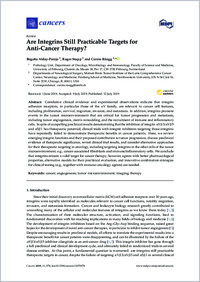Are integrins still practicable targets for anti-cancer therapy?
- Alday-Parejo, Begoña Pathology Unit, Department of Oncology, Microbiology and Immunology, Faculty of Science and Medicine, University of Fribourg, Switzerland
- Stupp, Roger Departments of Neurological Surgery, Malnati Brain Tumor Institute of the Lurie Comprehensive Cancer Center, Neurology and Medicine, Feinberg School of Medicine, Northwestern University, Chicago, IL 60611, USA
- Rüegg, Curzio Pathology Unit, Department of Oncology, Microbiology and Immunology, Faculty of Science and Medicine, University of Fribourg, Switzerland
-
2019
Published in:
- Cancers. - 2019, vol. 11, no. 7, p. 978
English
Correlative clinical evidence and experimental observations indicate that integrin adhesion receptors, in particular those of the αV family, are relevant to cancer cell features, including proliferation, survival, migration, invasion, and metastasis. In addition, integrins promote events in the tumor microenvironment that are critical for tumor progression and metastasis, including tumor angiogenesis, matrix remodeling, and the recruitment of immune and inflammatory cells. In spite of compelling preclinical results demonstrating that the inhibition of integrin αVβ3/αVβ5 and α5β1 has therapeutic potential, clinical trials with integrin inhibitors targeting those integrins have repeatedly failed to demonstrate therapeutic benefits in cancer patients. Here, we review emerging integrin functions and their proposed contribution to tumor progression, discuss preclinical evidence of therapeutic significance, revisit clinical trial results, and consider alternative approaches for their therapeutic targeting in oncology, including targeting integrins in the other cells of the tumor microenvironment, e.g., cancer-associated fibroblasts and immune/inflammatory cells. We conclude that integrins remain a valid target for cancer therapy; however, agents with better pharmacological properties, alternative models for their preclinical evaluation, and innovative combination strategies for clinical testing (e.g., together with immuno-oncology agents) are needed.
- Faculty
- Faculté des sciences et de médecine
- Department
- Médecine 3ème année
- Language
-
- English
- Classification
- Biological sciences
- License
-
License undefined
- Identifiers
-
- RERO DOC 327455
- DOI 10.3390/cancers11070978
- Persistent URL
- https://folia.unifr.ch/unifr/documents/308266
Statistics
Document views: 222
File downloads:
- pdf: 273
